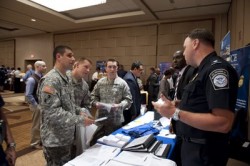 Today, as we honor America’s military veterans with parades and speeches and community luncheons, there is one form of recognition veterans value above most others. A job.
Today, as we honor America’s military veterans with parades and speeches and community luncheons, there is one form of recognition veterans value above most others. A job.
Young veterans, those who served in Iraq and Afghanistan — what the government classifies as Gulf War-era II — are struggling the most. For them, finding a job is harder than for other, older veterans. Their 10 percent unemployment rate, 37 percent higher than the population as a whole, tells only part of the story. It only suggests the dimension of a problem that leaves young veterans wondering what happened to the promises their country made to help them reenter civilian life.
Separating from the military combined with a lengthy civilian job search became a downward spiral that was difficult to escape for panelist and 2011 Medal of Honor recipient Dakota L. Meyer, now a Marine Corps reservist who also travels the country to listen to the concerns of fellow veterans.
“There aren’t too many jobs out there for snipers,” he said of his military occupational specialty, speaking in Washington last week on a panel of veterans organized by the Department of Labor. “[But] veterans bring so many skills to the table, companies need to realize that.”
Explaining those skills to recruiters, even to the sympathetic recruiters who will attend the dozens of veterans job fairs that have been organized for today, is but one of the challenges young vets have. Getting recruiters to see how leading a patrol in hostile territory translates to working as an assistant manager is even harder.
Of course, not everyone was in combat. Many more veterans were in support roles, handling logistics, working as clerks, serving as communications specialists, or maintaining all kinds of sophisticated equipment.
Roy Gibson, president of the Military Benefit Association and a retired Air Force Senior Master Sergeant, explained that a mechanic who worked on helicopters or jet engines can handle other mechanical jobs.
“They should market himself or herself more broadly as a mechanic,” Gibson told Business News Daily. “That will open up a lot more doors than if they tried to stick to what they’ve been doing.”
Knowing how to do that is anything but second nature to young veterans, many of whom entered the military directly from high school, so know little about searching for work. Recruiters, so focused on filling the specifics of a job req, often don’t see the transferability of skills and experience.
Organizations like Hire Heroes USA counsel vets on preparing a resume, and interviewing, especially in explaining how to translate their military experience into skills and talents recruiters understand. There are several online sites with translators that allow vets to enter their military title and have it translated into equivalent civilian job titles and skills. The Department of Veterans Affairs has one, which is replicated elsewhere on sites run by Monster and Home Depot, among others.
 Many companies have also stepped up their efforts to recruit ex-military. Starbucks announced just last week it will hire 10,000 veterans and their spouses over the next five years. Today, the third annual Veterans Day Virtual Career Fair will include participation from 50 of the country’s largest employers. Since 2011, 38,000 veterans have found jobs through job fairs like today’s.
Many companies have also stepped up their efforts to recruit ex-military. Starbucks announced just last week it will hire 10,000 veterans and their spouses over the next five years. Today, the third annual Veterans Day Virtual Career Fair will include participation from 50 of the country’s largest employers. Since 2011, 38,000 veterans have found jobs through job fairs like today’s.